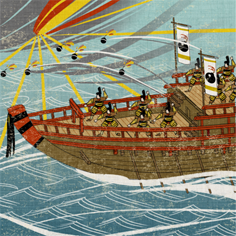
Basic Unit Statistics (can be modified by difficulty level, arts, skills, traits and retainers)
| Recruitment Cost | 1900 | |
| Upkeep Cost | 85 | |
| Marines | 60 | 50% |
| Seamen | 10 | 5% |
| Hull Strength | 200 | 2% |
| Morale | 16 | 32% |
Strengths & Weaknesses
- Medium-sized, average speed vessel.
- Devastating short-range firebombs.
- High morale.
- Weak in ranged combat.
- Weak in boarding battles.
Abilities
- Banzai - This crew can enter into a frenzied state for a short period of time, temporarily increasing their morale, attack and defensive capabilities, making them unbreakable.
- Battle Speed - This increases a ship's rowing speed for a short period of time.
Description
Firebomb ships can rain down death upon enemies, assuming they are foolish enough to remain within range.
Firebomb ships are unusual vessels because they are used to attack the fabric of other ships rather than kill their crews. They have a short range attack that causes much damage, but are vulnerable to boarding counter-attacks: fireship crews are not trained for close combat. Most of their expertise concerns their dangerous and inflammatory weapons, which are pots filled with assorted demonic sulphurous chemicals, and men who use such devices need much courage before they even face an enemy. This gives them excellent morale in battle, as any danger from enemies has to be measured against the danger of the firebombs themselves. Firebomb ship crews have the Banzai special ability. Although gunpowder weapons were not employed during the Gempei War, the technology was available in China and would have been known to the Japanese by repute if nothing else. Gunpowder, and assorted unpleasant ways of using it against enemies, had been invented by accident in China some 200 years earlier. Alchemists had been searching for an elixir of immortality, a quest common to the profession across the world. European alchemists would spend centuries looking for the "philosopher's stone" for its immortal benefits. Gunpowder and its successors, on the other hand, are almost certainly one of the greatest causers of mortality yet discovered.